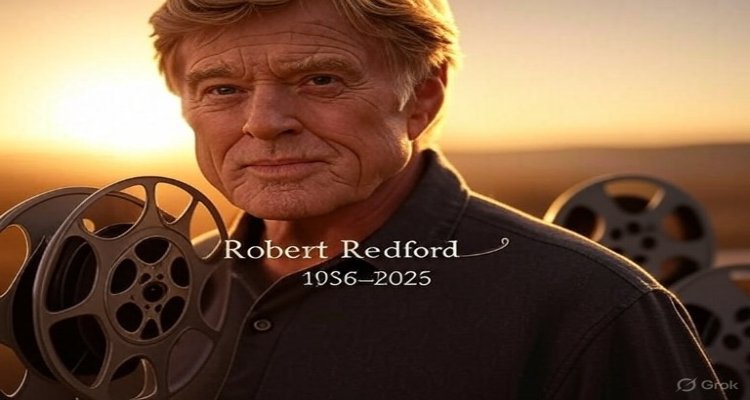Hollywood Icon Robert Redford Dies at 89

Oscar-winning actor and Sundance founder Robert Redford has died at 89. A legendary figure of American cinema, his legacy reshaped filmmaking and independent film culture.
Introduction
Robert Redford, one of Hollywood’s most enduring and respected figures, has died at the age of 89. The Oscar-winning actor-turned-filmmaker, who passed away on September 16, leaves behind a towering legacy of artistry, activism, and innovation. Redford was more than just a screen presence; he was also an architect of America’s independent film movement, a mentor to generations of storytellers, and a household name synonymous with cinematic excellence.
Context & Background
Born Charles Robert Redford Jr. on August 18, 1936, in Santa Monica, California, Redford grew up far from the glitz of the Hollywood he would later define. Initially drawn to painting and the arts, he studied at the American Academy of Dramatic Arts in New York, honing his performance skills while retaining a visual artist’s eye for detail and emotion.
Redford’s early career was grounded in television and theater. He appeared in iconic small-screen staples of the late 1950s and early 1960s — The Twilight Zone, Alfred Hitchcock Presents, and The Untouchables. His persistence paid off when he captured attention on Broadway in Neil Simon’s romantic comedy Barefoot in the Park, a role that would prove pivotal to his move into cinema.
Main Developments: A Career That Defined an Era
Redford made his film debut in 1962’s low-budget war film Warhunt, but it was Barefoot in the Park (1967), opposite Jane Fonda, that brought him lasting recognition.
By the 1970s, Redford was one of Hollywood’s biggest names. His credits read like a canon of American political and romantic cinema: The Candidate (1972), The Way We Were (1973), All the President’s Men (1976), and Three Days of the Condor (1975). His portrayal of complex yet principled characters captured an audience deeply engaged in the social transformations of the time.
Perhaps his most famous partnership was with friend and co-star Paul Newman. Their collaborations in Butch Cassidy and the Sundance Kid (1969) and The Sting (1973) are etched into Hollywood history, offering audiences charm, wit, and timeless storytelling. The former inspired the naming of Redford’s Sundance Institute — an enduring nod to his role as both performer and pioneer.
In 1980, Redford turned his focus behind the camera, winning the Academy Award for Best Director with Ordinary People, which also clinched Best Picture. He became part of a rare Hollywood club — equally admired as an actor and director.
Expert Insight & Public Reaction
The film community has reacted with an outpouring of tributes, marking Redford’s passing as the end of a cinematic era.
“Redford bridged the worlds of movie star glamour and socially conscious storytelling,” said Dr. Elaine Marcus, a film historian at UCLA. “He combined charisma with conscience, offering not just performances but statements.”
Actors and directors alike have acknowledged the path he carved through the industry. “Without Robert Redford, Sundance wouldn’t exist,” remarked Ava DuVernay, who debuted her breakthrough film at the festival. “He fought for voices who had no platform — and built that platform for them.”
On social media, fans remembered Redford not only for his iconic roles, but also for his enduring image: the ruggedly handsome actor who became a cultural emblem of thoughtful, authentic cinema.
Impact & Implications
Robert Redford’s passing raises poignant questions about the future of independent film. Through the establishment of the Sundance Institute in 1981, he transformed the industry’s landscape, creating a fertile ground for diverse and experimental voices. The Sundance Film Festival grew into the premier showcase for independent cinema, launching careers of filmmakers such as Quentin Tarantino, Steven Soderbergh, and Chloé Zhao.
Redford’s dual legacies — as a Hollywood leading man and as the patron saint of independent cinema — are a blueprint for how one individual can influence both the mainstream and the margins of creative storytelling. His death is not merely the departure of a beloved actor; it is the passing of an era where artistry, political consciousness, and risk-taking converged.
Conclusion
Robert Redford’s life cannot be captured solely by his filmography or awards. He embodied the evolution of American cinema — from the golden glamour of Hollywood’s studio system to the rebellious spirit of the independent movement. He was an actor who became a director, and a director who became a visionary builder of institutions. His passing at 89 marks the close of a luminous chapter in film history, but his impact will endure in every festival premiere and in every filmmaker he inspired to tell bold, uncompromising stories.
From the outlaw charm of Sundance Kid to the guiding force of Sundance Institute, Robert Redford was — and will remain — a legend.
Disclaimer : This article is a tribute news piece prepared for informational and reporting purposes. All details are based on verified biographical and historical records.










